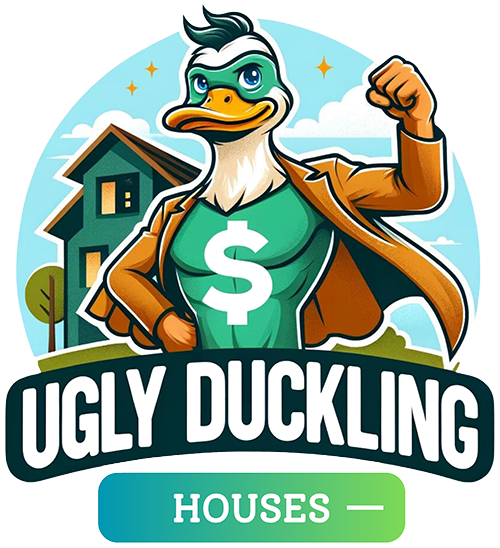When you sell an investment property, the IRS and the Wisconsin Department of Revenue both want their share. For many Wisconsin investors, “investment property taxes capital gains” is a confusing phrase—yet understanding it can save (or cost) you thousands. Below you’ll find a plain-English guide to how capital-gains taxes work on real-estate investments, the special 30 % Wisconsin exclusion, and smart strategies—including why a quick cash sale to Ugly Duckling Houses can sometimes be the most profitable move.
Capital Gains 101—How the Tax Is Calculated
Capital gain equals sale price minus your adjusted basis (purchase price ± improvements – depreciation). If you bought a duplex for $200,000, spent $25,000 on upgrades, claimed $30,000 in depreciation, and later sold for $300,000, your gain is:
$300,000 – ($200,000 + $25,000 – $30,000) = $105,000.
Hold that property 12 months or more and the IRS treats the profit as long-term; sell sooner and it’s short-term—taxed as ordinary income. turbotax.intuit.com
Federal Capital-Gains Rates for 2025 in Wisconsin
For 2025 the long-term federal rates are still 0 %, 15 %, or 20 %, depending on taxable income thresholds (most investors fall in the 15 % bracket). Short-term gains follow your regular bracket. nerdwallet.com
| Filing Status | 0 % up to | 15 % up to | 20 % above |
|---|---|---|---|
| Single | $48,350 | $533,400 | $533,400+ |
| Married Joint | $96,700 | $583,750 | $583,750+ |
Wisconsin’s 30 % Exclusion
Unlike many states, Wisconsin doesn’t have a special capital-gains rate. Instead, it lets you exclude 30 % of net long-term gains on assets held more than one year (60 % for certain farm property). That effectively lowers your state bill by nearly one-third. revenue.wi.gov
Example: On a $100,000 long-term gain, only $70,000 is added to your Wisconsin taxable income. That $70,000 is then taxed at the progressive state rates (3.5 % to 7.65 %). uncommoncentsinvesting.com
Because the exclusion is a subtraction rather than a credit, high-income investors in the 7.65 % bracket save about $2,300 more per $100k of gain than they would in a flat-rate state. Timing your sale to qualify can be a bigger lever than minor cosmetic renovations.
Short-Term vs. Long-Term: Why 12 Months Matters
- Short-term (≤ 1 year): taxed as ordinary income—up to 37 % federally plus Wisconsin rates.
- Long-term (≥ 1 year): qualifies for the lower federal brackets and the 30 % Wisconsin exclusion.
Holding just one day past a year can cut a combined bill by 10-30 points—huge for flippers who can afford to lease a property for a few extra months. turbotax.intuit.com
Deferral & Reduction Strategies in Wisconsin
| Strategy | How It Works | Key Deadlines |
|---|---|---|
| 1031 Exchange | Swap like-kind property and defer 100 % of gains. Identify replacement within 45 days, close in 180 days. steadily.com | 45/180 days |
| Installment Sale | Receive payments over time; spread gain (and tax) across years. | Flexible |
| Opportunity Zone Fund | Reinvest within 180 days; defer until 2027 and cut future gains by 10 % after five years (rules may change). | 180 days |
| Cost Segregation & Depreciation Recapture Planning | Front-load depreciation to shelter rent today; plan exit to offset recapture with capital-loss harvests. | Ongoing |
Why a Cash Sale Can Trump Tax Maneuvers
Complex strategies incur fees, strict timelines, and audit risk. Ugly Duckling Houses buys houses as-is for cash in Wisconsin, letting you close on your schedule and roll equity into your next deal without the stress of meeting 1031 deadlines or tenant-coordination headaches. In hot Wisconsin markets—where the median sale price rose to $300,000 in April 2024—locking in today’s appreciation quickly can outweigh incremental tax savings. wra.org
Why Gains Are Growing in Wisconsin
Wisconsin’s median price jumped 6.4 % year-over-year in April 2024, and sales volume is up double-digits after a tight 2023. Wisconsin investors who bought just three years ago have often seen paper gains of $60,000-$100,000 on a standard single-family rental. wra.org With price momentum outpacing rent growth, many landlords cash out rather than refinance—making tax planning essential.
Frequently Asked Questions
Q1. How long must I hold a rental to qualify for long-term capital-gains treatment?
At least 12 months + 1 day from purchase date to closing date. turbotax.intuit.com
Q2. Does Wisconsin really let me exclude 30 % of my gain?
Yes—on assets held more than one year. File Schedule WD and subtract 30 % of net long-term gain before applying state brackets. revenue.wi.gov
Q3. Can I avoid capital-gains tax by buying another property?
A properly structured 1031 exchange defers (not eliminates) the bill. You must identify a replacement within 45 days and close within 180 days. steadily.com
Q4. Are rehab costs deductible against capital gains?
Yes—capital improvements (new roof, HVAC) raise your basis and reduce the gain. Routine maintenance does not.
Q5. What if the house was ever my primary residence?
You may exclude up to $250k ($500k joint) of gain federally if you lived there two of the last five years. Wisconsin still gives the 30 % exclusion on any taxable remainder. revenue.wi.gov
Q6. How does depreciation recapture affect me?
Prior depreciation is taxed up to 25 % federally on sale. Wisconsin treats recapture as ordinary income—no 30 % break—so plan for a higher state bill here. kiplinger.com
Why Investors Choose Ugly Duckling Houses
- Speed & Certainty – Close in as little as seven days; skip the 45-day 1031 scramble.
- As-Is Convenience – No repairs, tenant buyouts, or last-minute appraisal issues.
- Tax-Smart Offers – We’ll connect you with vetted CPAs who understand Wisconsin’s exclusion and can project your after-tax proceeds before you sign.
- Local Expertise – Decades of deals across Wisconsin give us real-time pricing insight you won’t get from national iBuyers.
Contact Us Today!
Capital-gains taxes don’t have to eat your profit. By understanding federal brackets, leveraging Wisconsin’s unique 30 % exclusion, and choosing the right exit strategy, you can keep more of every hard-earned dollar. Ready to see how a no-obligation cash offer stacks up against listing or a complicated 1031 exchange? Contact Ugly Duckling Houses today or call 262-994-7004.

